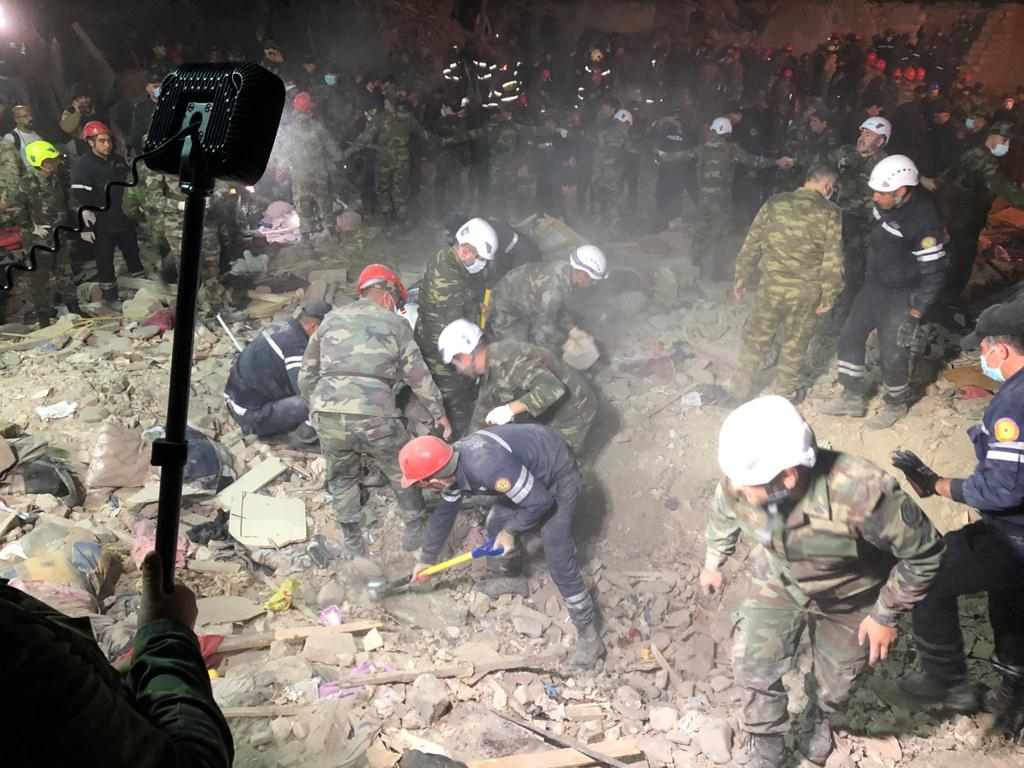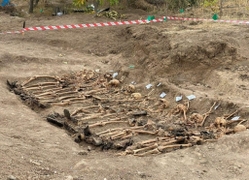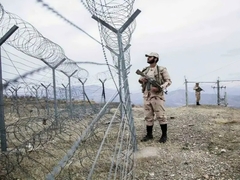Two years have passed since the deadly missile attack on Azerbaijan's Ganja city during the Second Karabakh War in 2020.
On October 4, 2020, at 10:00 am local time, the Armenian military launched a ballistic missile on Ganja, killing one civilian and wounding 30 others. Although Armenian military leadership denied the allegation, Yerevan-backed separatists illegally settled in Azerbaijan's Karabakh region claimed responsibility, stressing that military buildings and the international airport in Ganja had been targeted. However, the Azerbaijani side submitted facts that there were no military facilities in the city.
Armenia and Azerbaijan had been locked in one of the world’s most protracted conflicts for nearly three decades. Following the Soviet Union’s dissolution in 1991, Armenia launched a full-blown military campaign against Azerbaijan, marking the longest and deadliest war in the South Caucasus region. The bloody war lasted until a ceasefire in 1994 and saw Armenia occupying 20 percent of Azerbaijan’s internationally recognized territories. Over 30,000 Azerbaijanis were killed, and one million were expelled from those lands in a brutal ethnic cleansing policy conducted by Armenia.
On September 27, 2020, the decades-old conflict between Armenia and Azerbaijan spiraled after Armenia’s forces deployed in the occupied Azerbaijani lands shelled military positions and civilian settlements of Azerbaijan. During the counter-attack operations that lasted 44 days, Azerbaijani forces liberated over 300 settlements, including the cities of Jabrayil, Fuzuli, Zangilan, Gubadli, and Shusha, from nearly 30-year-long illegal Armenian occupation. The war ended in a tripartite statement signed on November 10, 2020, by Armenia, Azerbaijan, and Russia. Under the statement, Armenia also returned the occupied Aghdam, Kalbajar, and Lachin districts to Azerbaijan.
During the 2020 war, Ganja was repeatedly subjected to rocket attacks.
Following the first incident on October 4, the Armenian military targeted Azerbaijan's second-largest city on October 5, 8, 10, and 17. The civilian death toll in the wake of the assaults stood at 32, while at least 125 others were wounded.
The Mine Action Agency of Azerbaijan (ANAMA) confirmed that unguided Smerch artillery rockets and Scud-B ballistic missiles were used in attacks on Ganja. Scud-B missiles, which are able to carry a 985-kg high-explosive warhead, cannot be directed at a specific military target.
“Armenian forces repeatedly launched missiles, unguided rockets, and heavy artillery into populated cities and villages in violation of the laws of war,” said Hugh Williamson, Europe and Central Asia director at Human Rights Watch following on-site investigations of the outcomes of the Armenian missile offensive.
“Again, and again in the course of the six-week war, these attacks unlawfully destroyed civilian lives and homes and should be impartially investigated.”
The Azerbaijani government has strongly condemned the attacks as acts of genocide against the Azerbaijani people. The Assistant to the President of Azerbaijan, Head of the Foreign Policy Affairs Department of the Presidential Administration, Hikmat Hajiyev called it a “state-sponsored terrorism” by Armenia, urging condemnation from the international community.
Türkiye was the first country to inveigh against the attacks on Ganja by accusing Armenia of committing a war crime. The ambassadors of Qatar, Switzerland, Malaysia, and the UK to Azerbaijan voiced their regret and delivered condolences to the families of the victims of the third attack. The European Union condemned the fourth attack and UN Secretary-General António Guterres called it unacceptable.
The Prosecutor General’s Office of Azerbaijan confirmed that 98 civilians were killed and 414 wounded during the 44-day war in 2020, and over 3,000 homes and 100 apartment buildings were destroyed or damaged. Azerbaijani government officials told Human Rights Watch that 40,000 people in the country, in particular women and children, fled from the war-affected areas to safer directions within the borders of Azerbaijan.







 Turkmen President Serdar Berdimuhamedow and British Secretary of State for Foreign Affairs, Commonwealth Affairs, and Development David Cameron dis...
Turkmen President Serdar Berdimuhamedow and British Secretary of State for Foreign Affairs, Commonwealth Affairs, and Development David Cameron dis...
 A draft resolution aimed at preventing the development and deployment of weapons of mass destruction (WMDs) in outer space, co-sponsored by Japan a...
A draft resolution aimed at preventing the development and deployment of weapons of mass destruction (WMDs) in outer space, co-sponsored by Japan a...
 Russia and Ukraine have engaged in direct negotiations facilitated by Qatar to address the exchange of children affected by the ongoing conflict.
Russia and Ukraine have engaged in direct negotiations facilitated by Qatar to address the exchange of children affected by the ongoing conflict.



